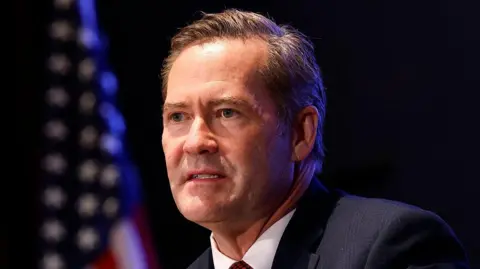In a significant political shift, U.S. President Donald Trump has announced the removal of Mike Waltz from his role as national security adviser, proposing instead that he take up the position of ambassador to the United Nations. This decision marks a notable development in Trump’s second term, as Waltz becomes the first senior official to exit the administration. The transition came after Waltz faced scrutiny for a misstep that involved adding a journalist to a sensitive military chat group, raising concerns about the handling of classified information.
In a heartfelt social media post, Trump expressed gratitude for Waltz’s service, crediting him for prioritizing national interests throughout his career. The president’s nomination of Waltz to the UN post comes at a time when maintaining strong national security measures is a pivotal discussion point within the administration. Waltz’s temporary replacement will be Secretary of State Marco Rubio, who is set to juggle both roles as America’s top diplomat and national security adviser. This unusual dual capacity had not been seen since the tenure of Henry Kissinger, who held these influential positions over half a century ago.
Waltz, previously a congressman from Florida, has had a notable influence on national security issues, being regarded as one of Trump’s closest advisers. Despite the president’s positive remarks about Waltz, the circumstances surrounding his removal indicate underlying turbulence. He had recently faced significant backlash due to a serious error involving communication on a secure platform called Signal. The incident was embarrassing for the administration and is expected to be a focal point during Waltz’s confirmation hearings for the UN ambassadorship.
Sources close to the situation have suggested that Waltz’s departure was somewhat of a strategic maneuver by Trump. Given the controversy from the chat leak and perceptions regarding Waltz’s competence in vetting National Security Council staff, the administration believed he might struggle to gain Senate confirmation. In this way, the nomination to the UN ambassadorship serves as a “soft landing,” allowing Waltz to transition into a prominent role while sidestepping a deeper fallout from his national security position.
Waltz himself expressed gratitude over his new nomination, emphasizing his commitment to continue serving Trump and the American people. However, this transition comes amid doubts about Waltz’s ability to effectively lead as UN ambassador, particularly in light of the political landscape and potential Senate opposition. The incident involving the Signal messaging app, where sensitive military plans were discussed, has already raised suspicions and critiques from various quarters.
The administration is now left to grapple with not only the ramifications of Waltz’s exit but also the uncertain fate of his deputy, Alex Wong, who had also been part of the controversial chat. Wong’s handling of the situation was questioned, and he was seen as a significant figure in the previous discussions surrounding military strategy with Yemen’s Houthis.
As of now, reports indicate varying prospects for Waltz’s successor. Speculations have arisen about potential candidates such as Steve Witkoff, a notable real estate developer, and Ric Grenell, a former special envoy with extensive diplomatic credentials. This period of transition reflects a broader theme within Trump’s administration: the frequent reshuffling of key positions amidst ongoing controversies—a trend that critics, including former advisor John Bolton, have characterized as chaotic.
In conclusion, the elevation of Mike Waltz to a new role prepares him to navigate the challenges ahead at the UN, while prompting crucial conversations around accountability and the management of national security. As the Trump administration continues to operate under a cloud of scrutiny and change, the integrity of its approaches to both domestic and international security will inevitably be under the microscope.



